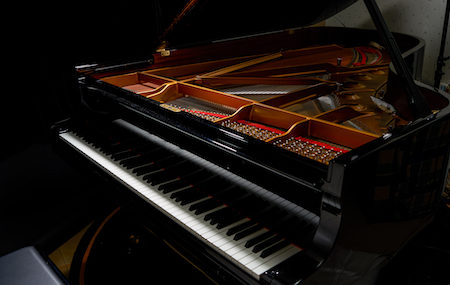There’s a difference between upgrading a starter instrument and selecting an advanced piano.
A piano is one of the most significant investments a pianist can make. Choosing the right instrument can make a substantial impact on your playing experience. With so many options available, it can be overwhelming to know where to start. Here is a guide to buying an advanced piano.
Know Your Budget
Before you start looking at pianos, determine your budget. Advanced pianos can range in price from a few thousand dollars on up. Keep in mind that the price of the piano is not the only expense you will incur. Other costs to consider include tuning, maintenance, and transportation.
Determine Your Needs
Consider the style of music you’ll be playing and your skill level. If you’re an advanced pianist, you may want a piano with more advanced features, such as a concert grand piano, which provides a broader range of notes and better sound quality. A digital piano can also be a good choice if you want more versatility and flexibility.
Choose the Right Size
The size of a piano can significantly impact its sound quality. Generally, larger pianos will produce a richer, fuller sound. However, larger pianos can also be more challenging to transport and take up more space in your home. Consider the size of the room where the piano will be placed and ensure enough space for the piano and the player.
Consider the Type of Piano
Several types of pianos are available, each with its own benefits and drawbacks. Grand pianos are ideal for large performance spaces and provide a deep, rich tone. Upright pianos are more compact and offer a brighter, tighter sound. Digital pianos provide versatility and flexibility, with the ability to emulate different types of pianos and other instruments.
Check the Action
The piano’s action refers to the mechanism that translates the pressure from the keys into the hammers hitting the strings. The action can significantly impact the piano’s sound and playability. Consider the weight of the keys and the overall feel of the action when playing. Look for a piano with a consistent, smooth action that is easy to play.
Listen to the Sound
The sound of a piano is perhaps the most crucial factor to consider. Take the time to listen to several pianos and compare the sound quality. Consider the tonal range, the richness of the sound, and the clarity of the notes. Pay attention to how the sound changes as you play louder or softer.
Consider the Brand
Choosing a reputable brand can help ensure the quality of your piano. Some well-known piano brands include Remington, Kohler & Campbell, and Seiler. These brands have a long history of producing high-quality instruments and are known for their consistent quality and excellent sound.
Get Professional Advice
Finally, consider seeking the advice of a professional piano technician or a piano instructor. They can provide valuable insight into the features and qualities of different pianos and help guide you in your decision-making process.
Buying an advanced piano is a significant investment, but with the proper research and careful consideration, you can find an instrument that will provide you with years of musical enjoyment.
How can we help you find the perfect piano for your skill level and musical aspirations?


